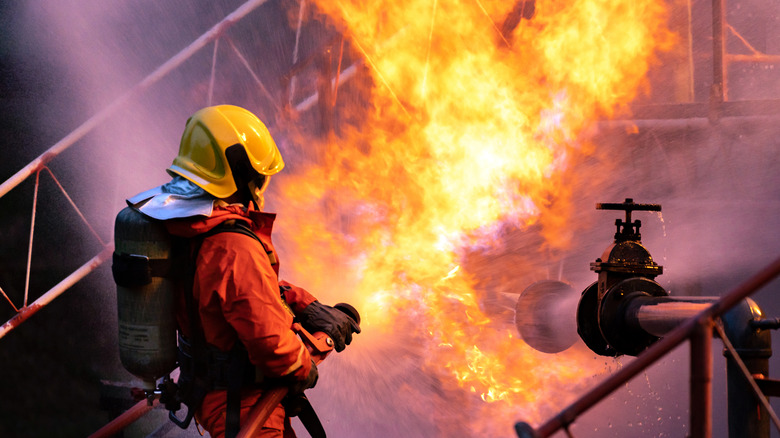What It's Really Like To Work On An Offshore Oil Rig
During the COVID-19 pandemic of 2020-2021, tens of millions of workers around the world learned that much of (or all of) their jobs can be done at home. Indeed, as Slate reported, millions found working from home so much to their liking that they're considering quitting rather than going back to a physical workspace.
Of course, not all jobs can be done remotely. If, for example, you work in a factory, there's no operating the machines, or moving around the product, from home. If you're a miner, you have to go to the mine to extract the ore. And so on.
One such job is that of an offshore oil rig worker. Not only is there no doing it from home, there's no doing it anywhere except out in the middle of the ocean, where the oil is (or, under it, to be more specific). Working in those conditions can be challenging in the best of circumstances, and downright dangerous in the worst. It's grueling, physically demanding labor that is done 24 hours a day, seven days per week, and if you can manage to get such a job, you'll likely be very well-compensated for it.
It's a communal atmosphere
Following a few days of ground-based safety training, according to People with Energy, a new oil rig worker will take a helicopter ride to their new home. Once there, they'll join a couple hundred of their new friends, with whom they'll live and work for the duration of their contract.
The living quarters are described as "like a cross between a hotel and an office," with two to four workers sharing a room (although a lucky few may get private rooms), and everyone sharing communal bathroom facilities. According to NES Fircroft, workers will eat at a canteen facility, where professional kitchen staff will do all the cooking and cleanup for them, with fresh food being flown in from time to time. Similarly, a cleaning crew will keep the living quarters nice and tidy.
When they're not on the schedule, workers will have access to in-room TVs, as well as game rooms equipped with pool tables, large-screen TVs, and the like.
However, there will be no relaxing with a tall, cold one after a hard day at work, nor will there be any mellowing out by sparking a bowl (of cannabis). Due to the safety-forward nature of life on an oil rig, alcohol and non-prescription drugs are banned.
The hours are long
While most workers do their thing from "9 to 5," as the colloquialism calls it, the work schedule on an oil rig isn't like that, says People with Energy. Twelve-hour shifts are more the norm. What's more, there are frequent safety meetings, debriefings, training sessions, and other matters requiring workers' time, according to Drillers.com. Since oil rigs operate 24 hours a day, almost all workers will be expected to pick up night shifts.
Depending on the length of the worker's contract, he or she can expect to work two weeks straight through, followed by a two-week vacation, for lower-paid workers. This pattern means that, on average, an offshore oil rig worker will work about 400 hours more per year than a regular, 9-5 laborer. Further, some of the higher-ups might work two weeks on, followed by three weeks off.
Of course, as Greenery Financial notes, every rig is different, and shifts may be structured differently according to needs of the rigs and the requirements of the company that manages it.
An oil rig job is extremely dangerous
Workers on an oil rig must contend with the ever-present danger of fire. A blaze can imperil everyone on the rig (where rescue is going to be tricky at best, impossible at worst), to say nothing of the possible environmental damage that could be caused by a crude oil fire.
As such, preventing fires, and keeping them contained, is of utmost importance on an oil rig, as Petapixel notes. Most forms of electronics are prohibited outside of crew areas, and cell phones are absolutely forbidden. Even photographers must get special clearance and use a special explosion-proof camera while on board. On the rigs that allow smoking, lighting up is only done in a special area on the rig, away from sensitive equipment. Smokers use matches, not lighters, according to NES Fircroft.
And of course, the sea itself can be hazardous. According to the Doan Law Firm, drowning is a possibility. And on some rigs, rough weather out at sea — to include hurricanes — can force an evacuation, as The Atlantic reports.
Back in the day, you couldn't call home, but now you can
Before the arrival of the internet, workers on an offshore oil rig were effectively cut off from their families for the duration of their contracts, as People with Energy reports. Those lucky enough to get to use the one telephone on a rig were limited to one call per week, and only for six minutes.
You still can't "call" home, at least, not in the sense of doing so on a phone. As mentioned previously, they're banned on oil rigs, and there's almost always no signal anyway. However, thanks to the internet, it's possible for workers to connect with their loved ones via video-conferencing, through programs such as Skype or FaceTime. Of course, as Drillers.com notes, there will be as many as 200 people on board the rig, all angling for the chance to talk with their families back home on the few computers available. As such, workers are expected to keep their calls to a reasonable length to allow everyone to get a chance.
The pay is extremely good
If working on an oil rig is isolating, demanding, and dangerous, those negatives are possibly made up for in a rather huge positive: the pay. Specifically, workers on oil rigs get paid pretty well. ZipRecruiter, for example, says that the average salary of an oil rig worker is $75,511 per year — roughly on par with what some lawyers earn, according to ZipRecruiter. Similarly, British energy company People with Energy says that the average salary of one of their offshore rig workers is £65,000 (about $90,000), which is more than double what the average British wage-earner earns.
Of course, as in every job, you have to start at the bottom, unless you have specialized training or education that automatically qualifies you for a higher-paying job and work your way up, according to Drillers.com. On a rig, the lowest-paying job is that of a roustabout, whose job is the most physically demanding and involves schlepping equipment here and there, cleaning it, and similar grunt work. What's more, competition is tough, both for entry-level work and even more so for lower-level workers keen to climb up the ladder into higher-paying positions.





